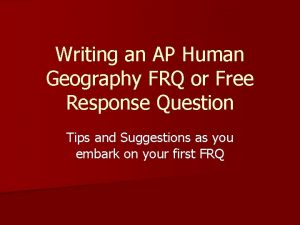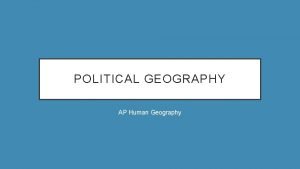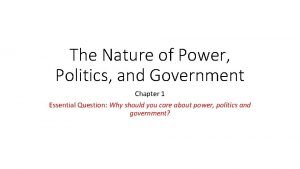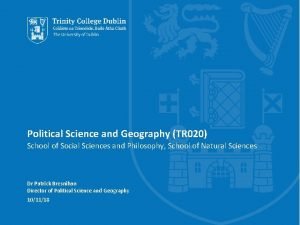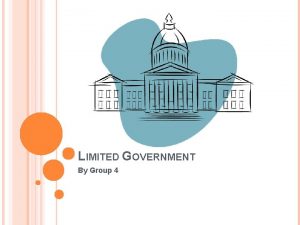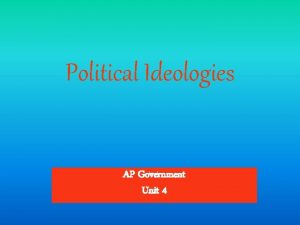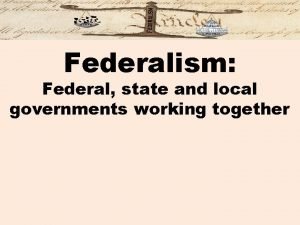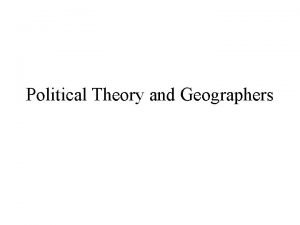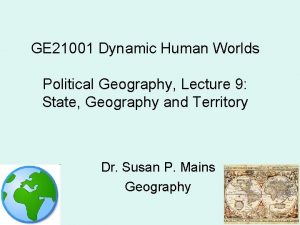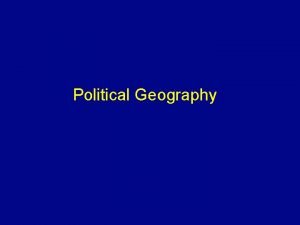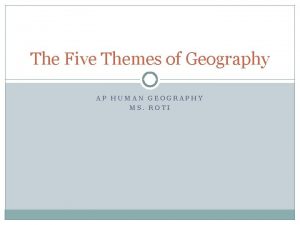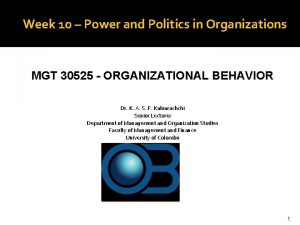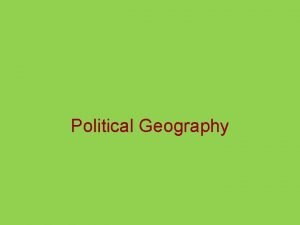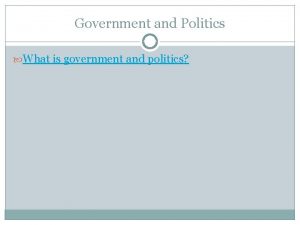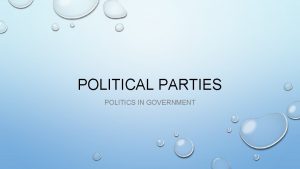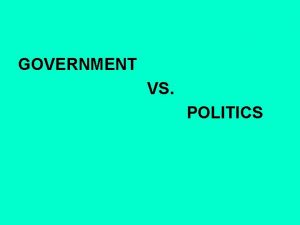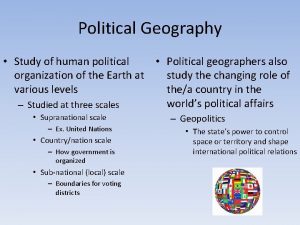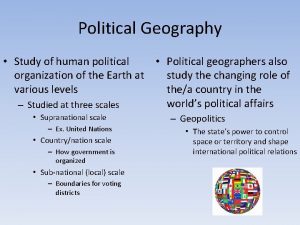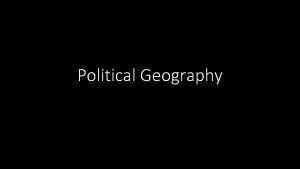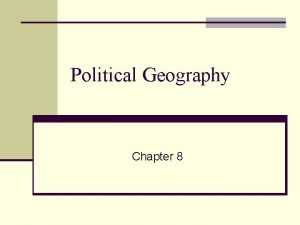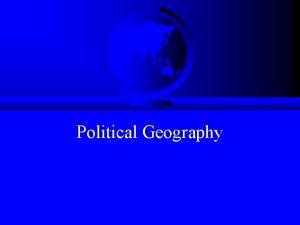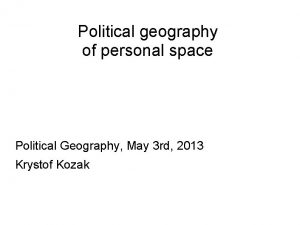Politics and Government What is Political Geography The


















- Slides: 18

Politics and Government

What is Political Geography? The study of governmental systems from around the world

What is Government? � An organization that people set up to protect their community and to enforce its rules � Roles of the government: To protect lives To protect liberties To protect property of members of the community To provide services that the people cannot provide on their own

What kinds of borders? � Political Borders – determined by govt. and are artificial (imaginary lines) � Example: North and South Korea � Natural Borders –created by physical features that divide one place from another � Example: Rio Grande River (Mexico and US)

What are the different types of governmental systems?

Monarchy � Ruled by a family headed by a King or Queen The ruler inherits their power - when the ruler dies, power is passed to one of the monarch’s children or close relative � These monarchs (kings, sultans, emperors) surround themselves with followers and advisors who help them govern � Pros – Stability � Cons – Limits on Power � Power is held by ONE person

Constitutional Monarchy �Monarchs share power with an elected legislature Parliament �Usually the monarch serves as the symbolic head of state while elected members of Parliament govern the country �Example: United Kingdom, Saudi Arabia, Jordan

Totalitarianism �A form of dictatorship that seeks to control all aspects of social life within a country • This control extends to the police, military, communications, economy and education system. • Government also controls television, radio, and newspapers. • Censorship of books and articles that criticize the government �No separate political parties, labor unions, or other organizations are allowed. �Government either controls or prohibits all churches and religious groups.

Communism • the state plans and controls the economy and a single - often authoritarian - party holds power • the elimination of private ownership of property or capital (common ownership) • Thinks in terms of society as whole. Example: Cuba, People’s Republic of China, North Korea • Pros – Classless Society • Cons – lack of Freedom

Republic A republic is a government without a king or a queen. • Usually when a country overturns its monarchy it will become a republic. • Republics can be democratic, theocratic, or parliamentary. • An example would be the United States, which is a Democratic Republic

Branches of United States Government

Democracy Government authority is based on the will of the people. • People either vote on issues directly, or they elect representatives who make government decisions for them. • People have certain rights – whereas they can criticize the government freely. � Direct Democracy � Representative Democracy � Modern Democracies

Direct Democracy The very first known democracy was in ancient Greece in the 5 th c BCE. • Democracy is Greek for “people-power. ” • Citizens assembled to make decisions for their city-states. • They voted on these issues directly. This is where the term directdemocracy evolved from.

Representative Democracy It is a democracy where different social groups elected their own representatives, who then met in assemblies. • Nobles were represented in the Senate • Government power was divided between two branches and voting was on various issues. • Romans were the first to develop the representative democracy.

Dictatorship � One individual holds complete political power � The leader either seizes control by force or is placed into a position of authority by others � the citizens have no influence over governmental policy and do not have the right to choose their own leaders � Pros – easy, quick to makes big changes � Cons – corruption, dissent is not allowed

Theocracy Government run by religious leaders. It is an old form of government, like a monarchy. � Government claims to be directed by God or divinely blessed. � No legal separation between church and state � Citizens of other faiths are often excluded or expelled. � Ancient times rulers were often priests. •

Examples of Theocracy throughout history. In the Middle Ages, the head The Byzantine Empire was ruled by of the Catholic Church, the an emperor who was also head of Pope, ruled extensive Pharaohs of ancient the church. territories in Italy. Egypt were believed to be Iran, has both a gods. theocratic and democratic government. The President and In early colonial times, representatives Puritan ministers helped are elected but govern Massachusetts. are controlled by The Supreme Leader is the Supreme an Islamic cleric Leader. appointed for life.

ASSIGNMENT �Create a chart
 Ap human geography frq format
Ap human geography frq format Ap human geography political geography test
Ap human geography political geography test Chapter 20 whose government
Chapter 20 whose government Ap government unit 1 study guide
Ap government unit 1 study guide The nature of power politics and government
The nature of power politics and government Relationship between political science and geography
Relationship between political science and geography Define limited government
Define limited government Political ideology definition ap gov
Political ideology definition ap gov State and federal constitutions
State and federal constitutions Classification of boundaries in political geography
Classification of boundaries in political geography Objectives of political geography
Objectives of political geography Political geography of australia
Political geography of australia Map europe 1990
Map europe 1990 Boundaries ap human geography
Boundaries ap human geography Compare geometric boundaries and antecedent boundaries.
Compare geometric boundaries and antecedent boundaries. Political geography
Political geography Centripetal force geography
Centripetal force geography 5 themes of geography ap human geography
5 themes of geography ap human geography Power and politics in organizations
Power and politics in organizations
